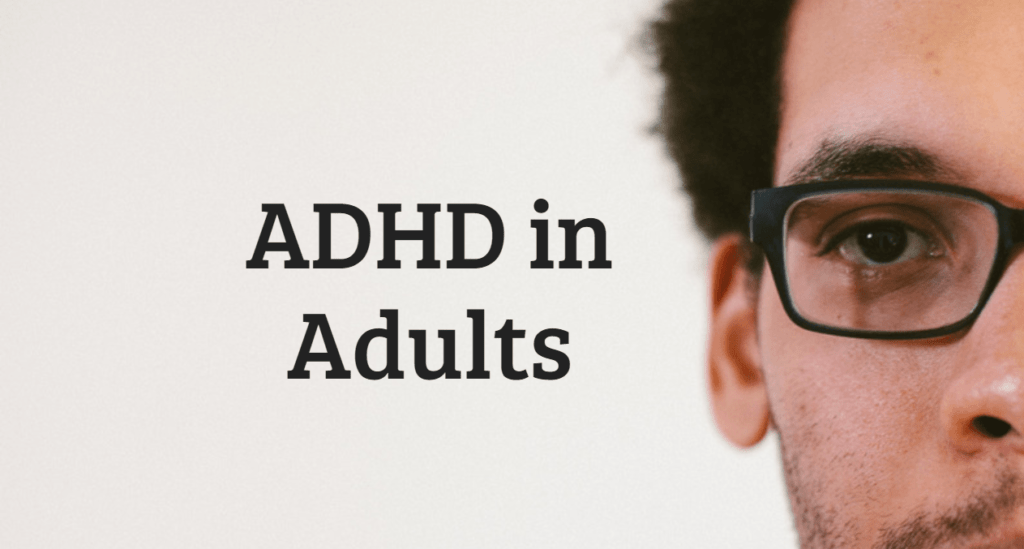Attention deficit hyperactivity disorder (ADHD) is an often misunderstood mental health condition. It can affect adults just as it affects children, and has a huge impact on the lives of those who have it.ADHD in adults can be hard to know if you have it. Many people don’t know they have it until they are older. When you have this mental illness, it can be hard to do the things you need to do. You might not be able to work or go to school. But with the right treatment plan, this won’t hold you back from living your life.
Contents
What Is ADHD In Adults?

Attention Deficit Hyperactivity Disorder is a brain disorder that affects an individual’s ability to focus and concentrate. Individuals who have Attention Deficit Hyperactivity Disorder may also be hyperactive, impulsive, or fidgety.
It often occurs in children but it can continue throughout one’s lifetime as well. In fact, nearly 60% of people with ADHD experience symptoms into adulthood. Researchers are not entirely certain why some adults seem to “grow out” of this neurological problem while others don’t.
There are currently no accepted medical tests that can diagnose Attention Deficit Hyperactivity Disorder. There are many reasons known causes of ADHD.
Signs and Symptoms of ADHD
- Trouble concentrating and focusing on work or school assignments.
- Having problems completing tasks and often losing things like keys, wallet, etc.
- People with ADHD may be forgetful about daily activities such as bathing, eating meals at regular times each day, taking medications regularly
- The person’s sense of time is also affected by this disorder;
- They may experience a general lack of awareness that causes them to lose track of days and months in terms of planning schedules ahead into the future.
- Frequently shifting from one activity to another without success in completing any task properly before moving on to something else.
- Having trouble organizing tasks or activities.
- Losing things frequently, like keys or cell phones.
- Being easily distracted by external events (noises/movements) and thoughts about other things they need to do next.
- Having a hard time focusing on one task.
- Being forgetful, especially about details that are not interesting to the person with ADHD (such as daily routines).
- Problems staying focused during work, school assignments – even for something they enjoy doing.
- They also struggle with chores at home like cooking dinner or taking care of laundry.
- Lack of ability to control emotions
- Poor relationship skills
Causes Of ADHD

There are many causes that indicate the presence of ADHD Disorder, some of them are mentioned below:
Genetics
- According to research, there are multiple genes that can contribute to the development of attention deficit hyperactivity disorder in adults. These include DRDAT and DAT-SLC12A gene clusters on chromosomes 16and 11 respectively.
- There is also evidence suggesting ADHD may be associated with mutations in the dopamine receptors (DRD) or other neurotransmitters like norepinephrine transporter (NET).
Environment
- There are many environmental factors that contribute to the development of ADHD in adults including:
- Strict parenting styles
- Child abuse or neglect
- Alcohol and drug use during pregnancy
- Exposure to toxins such as BPA (Bisphenol A) found in plastics, canned food liners, receipts printed on thermal paper.
- This is an endocrine disruptor that affects neurotransmitters like dopamine and serotonin resulting in hyperactivity behaviors.
Problems During Development
- People with ADHD tend to have problems during their development. This can cause them to suffer from executive dysfunction, it is a problem in which you can not plan tasks and manage time properly.
- The symptoms can be difficult to notice because they may not appear until someone is older or when that person encounters certain situations which force them to focus.
Effects Of ADHD In Adults
There are many effects of ADHD in adults, some of them are as follows:
Physical and mental health problems

- There are many symptoms that can lead to physical and mental health problems in ADHD Some of these symptoms include, Lack of sleep, which may affect moods and behavior in children with ADHD.
- Eating disorders such as obesity or anorexia nervosa, which interfere with the body’s ability to function well physically. A person who has ADHD might develop bipolar disorder because they have trouble controlling their emotions and impulses.
- This often leads them into risky situations like drug abuse or high-risk sexual behaviors. They also experience depression more frequently than people without ADHD.
Work And Financial Problems

- Adults with Attention deficit hyperactivity disorder (ADHD) often struggle and face many issues and problems at work. ADHD also affects the attendance of these individuals, as well as their ability to be productive employees.
- Those who are working in the office or anywhere, they can experience financial difficulties due to significant amounts of debt or loans that were not paid off in a timely manner because of the lack of attention given by adults suffering from this condition.
- This makes it harder to have a job when you have ADHD. You will be less successful and make less money if you have ADHD. This will lead to more stress and mental health problems like anxiety and depression.
Relationships Problems

- People with Attention Deficit Hyperactivity Disorder (ADHD) tend to be more impulsive and have greater difficulty in controlling their impulses.
- This can result in poor decision-making skills, especially when it comes to relationships. Here are some of the ways that living with ADHD affects your ability to build and maintain healthy relationships.
- People who live with an undiagnosed disorder often struggle even harder than others because they don’t understand why their personal or professional lives seem so difficult at times. You may feel guilty, frustrated, or angry about not being able to meet the challenges you face on a daily basis.
Risks Factors Of ADHD
Attention Deficit Hyperactivity Disorder is a chronic condition that can affect an individual in different ways. Symptoms of ADHD include difficulty focusing, lack of attention to detail, and hyperactivity. Furthermore, there are several other risk factors with this disorder such as:
The risks involved with having attention deficit hyperactivity disorder (ADHD) vary depending on different circumstances and situations unique to each individual.
- Genetics
- Environmental toxins
- Pregnancy
- Birth complications
- Certain medications can also trigger symptoms of this disorder
- Head injuries
Diagnosis Of ADHD In Adults

- Attention Deficit Hyperactivity Disorder in adults is a disorder with symptoms of lack of attention, impulse control, and hyperactivity. This condition affects both men and women equally. Symptoms typically occur in early childhood but may not be shows symptoms until later in life.
- The initial diagnosis of ADHD can often be difficult to diagnose because ADHD symptoms are similar to other problems such as depression or even sleep deprivation due to shift work schedules that many adults with ADHD face.
- Behavior therapy techniques are used along with medications like Adderall XR (amphetamine) combined with dextroamphetamine tablets which help improve focus and concentration among individuals suffering from this syndrome.
- The diagnostic process is usually more difficult than that of children. This is because it takes time to unravel the particular combination of symptoms present in adults, and new information can change how ADHD presents.
- For example, an individual may have had significant problems with attention as a child but now functions well at work or school (which makes diagnosis challenging), or has learned coping skills through life experience which modify his/her behavior enough to function normally despite deficits remaining.
- The doctor will need to rule out other possible causes for these behaviors first before arriving at this conclusion; however even once they are eliminated there often remains some doubt about whether the deficits truly reflect ADHD or not. This situation leads many doctors toward over-diagnosis rather than under-diagnosis of adult ADHD.
Treatment For ADHD In Adults
There are many treatments available for ADHD in adults, some of them are as follows:
Medical Treatment
- Treatment for adults includes medications, psychotherapy, or a combination of both treatments. Stimulant medications are the most common treatment, to manage symptoms in adults with ADHD.
- These include methylphenidate (Ritalin, Concerta), mixed amphetamine salts (Adderall), dextroamphetamine (Dexedrine), and lisdextroamphetamine (Vyvanse).
- Non-stimulants such as atomoxetine(Strattera) have also shown effectiveness at treating the symptoms of adult ADD/ADHD but may be less effective than stimulants. Other drugs that are sometimes shown beneficial effects to treat adult ADHD include bupropion (Wellbutrin), tricyclic antidepressants, and SNRIs.
Why Stimulants Are Not Always Ideal?
- Patients with a substance use disorder who have ADHD may be more likely to misuse their medication than non-ADHD patients taking stimulant medications for the treatment of other conditions, leading to addiction problems.
- This is the reason why doctors prefer not to treat adults with ADHD mainly using stimulants alone when there are alternative treatments that can also help manage symptoms without the potential negative side effects which result from long-term usage of these drugs.
Non-medication-based treatments
Psychotherapy, ADHD coaching, and neurofeedback can be effective in treating the symptoms of adult ADD/ADHD.
Psychotherapeutic Approaches
- Cognitive Behavioral Therapy is a form of therapy that helps an individual identify problematic behaviors and thoughts related to their condition so they can avoid them or solve problems more effectively through life.
- CBT may help those with ADHD manage time, organize activities, set goals, and complete tasks successfully despite challenges that might otherwise seem insurmountable without such assistance.
- It also teaches adults how to use coping skills like self-talk (talking to yourself) or visualization techniques at times when it would be beneficial for them to do so if they are feeling overwhelmed by their environment for example. Other forms of psychotherapy to help adults with ADHD include interpersonal, family, and social rhythm therapy.
Neurofeedback
- The goal of neurofeedback is to alter a person’s brainwave patterns using information about the activity in his/her brain so that it better matches how he or she wants their brain to function.
- It is being beneficial for those who have ADHD because research shows patients become more aware of what types of activities trigger symptoms as well as which coping strategies work best at managing them overtime
- In some cases, pharmacological approaches may also be helpful along with psychotherapy and neurofeedback techniques depending on the individual’s unique needs.
- Neurofeedback is a training technique that provides information to the brain about how it should be functioning, allowing for improved function and performance.
ADHD Coaching
- The goal of ADHD coaching is for people to change their behavior. This can be done by identifying the symptoms that have been experienced and then working on ways to improve upon them or avoid certain behaviors altogether.
- Oftentimes, it takes a combination of these two things in order to fully overcome some symptoms associated with ADHD. For example, if someone has trouble concentrating because they cannot sit still long enough, an ADHD coach will help this person figure out how best to work through sitting still.
- The purpose is to help adults with ADHD become more effective in their lives. It helps them learn how to use tools that work for them, increase awareness around certain areas that need improvement, and have someone outside of family or friends who can see things objectively without too much personal bias.
Other Things You Can Do To Manage ADHD In Adults
There are many alternatives for managing ADHD in adults. Not all of them will be right for you and your situation, but there may be one or more that could help with the symptoms and make it easier to live a fulfilling life.
- Healthy eating habits
- Exercise
- Yoga/meditation
- Mind-mapping tools
- Neurofeedback methods
- EEG biofeedback
- QEEG brain mapping devices
Conclusion
ADHD is a common condition that affects up to 3% of adults. Adults with ADHD often have problems in the workplace, in school, or at home. They may struggle to stay organized, focus on tasks, and manage their time well. If you are struggling with any of these symptoms, it could be due to untreated adult ADHD. Speak with your doctor today about getting an assessment for adult ADHD so you can live life more fully.
For more information, please contact MantraCare. ADHD is a neurodevelopmental disorder characterized by difficulty in paying attention, hyperactivity, and impulsivity. If you have any queries regarding Online ADHD Counseling experienced therapists at MantraCare can help: Book a trial ADHD therapy session


